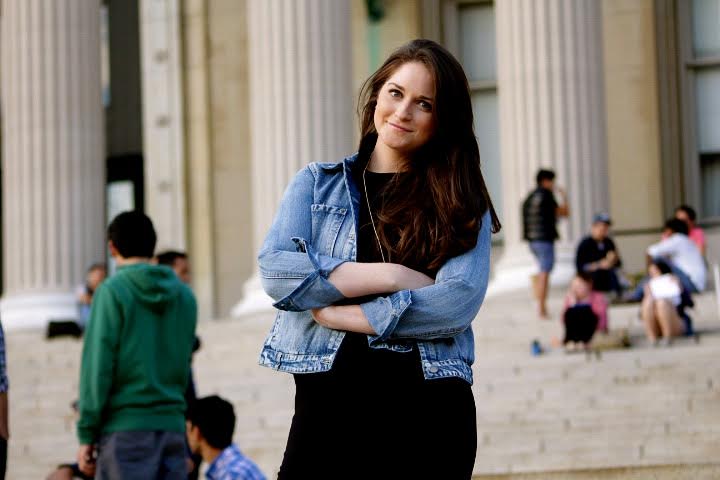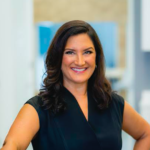Liz Wessel is the cofounder of WayUp, an innovative job search site that helps students and recent grads land internships, part-time jobs, and full-time entry-level jobs. As University of Pennsylvania students, Wessel and her cofounder, J.J. Fliegelman, realized that the early career job search process could be improved for job searchers and employers. After graduation, Liz and J.J. joined the corporate world at Google and McKinsey & Company respectively. But Liz always knew she wanted to be an entrepreneur and, in July 2014, Liz and J.J. founded WayUp (formerly CampusJob). They have raised more than $9 million from investors, hired a 45-person team based in New York City, and helped tens of thousands of students and recent graduates find jobs at businesses ranging from startups to Fortune 500 companies. WayUp is approaching a million users who represent more than 4,500 U.S. colleges; it’s clear that Wessel and Fliegelman are actualizing their goal.

What inspired you to start WayUp? What was your career path?
Throughout college, my cofounder, J.J., and I felt that there was a huge disconnect in the way that students were looking for jobs and the way that companies were hiring them. I wanted to solve this problem by creating a space where all job seekers could find awesome opportunities that they were qualified for and business owners wouldn’t lose their minds sifting through unqualified people. That’s why we started WayUp. We have since become the best and most efficient way to hire diverse and talented students and recent graduates.
As for my career path, I always knew that I wanted to start a company. When I graduated from the University of Pennsylvania, I decided to join Google so that I could learn from one of the best companies in the world, and then use those learnings to start WayUp. I was a product and brand marketer at Google for two years: first in California, then in India. Google inspired me to think big and taught me that I could do a great job if I was passionate about the topic — which, for me, was making an impact on the world in a positive way. It also taught me what top talent looks like, which was why I immediately agreed to work with my cofounder, J.J., given how incredibly talented I knew he was.
We crafted what the mission of the company should be: To connect students with awesome opportunities. As a result, I knew I needed to make an impact by creating a company that actually moved the needle and wasn’t just another social platform to send selfies on. (No offense to the selfie.)
What has been the biggest challenge and, on the flip side, the biggest reward of starting WayUp?
Honestly, every stage of our company has had its own unique challenge. At the beginning, it was figuring out how to raise money and how much to raise. Then it was all about scaling our marketplace efficiently since we didn’t want to grow one side bigger than the other. Then it was growing our team because we had raised a Series A for $8 million and needed to figure out who and how to hire. After that, it was deciding on a roadmap because there are so many exciting opportunities for our product. And the list goes on!
The biggest reward of starting WayUp has been working with, and learning from, our team of employees. When I left Google, I thought I’d never get the chance to work with such smart, driven people again. Then I started hiring and getting to know our employees, and I can safely say my team is phenomenal. I learn from every single person every day. I’m so grateful that they’ve taken a leap of faith to work for me and J.J. and help students all around the country get jobs.
What advice do you have for other women who hope to start their own businesses?
I have the same advice for men and women. Do your due diligence about the industry you want to enter, speak to as many experts as possible, and find a company that has tried something similar but failed. If you do all of that and still want to start your business — and can’t think about anything else but your business — then try to find a great cofounder who has complementary skills. And go, go, go!
What is a workday as Liz like? Please walk me through a day!
Every morning I wake up, grab a large iced coffee with soy milk and two Splenda and head to the office with my dog, Trooper. After I get to the office, I usually have meetings from 9 a.m. to 6 p.m. with no breaks. These meetings include internal meetings about strategy, external meetings with investors and CEOs, and sales pitches with customers. I try to keep as many meetings at the office as possible to avoid wasting time in transit, but you can often find me running around the city. After 6 p.m., I usually head out to an event I’m speaking at or a CEO or investor dinner I’m attending. After that, I either go back to the office around 9 p.m., or I go home and work from my dining room table. Luckily, the ability to go without much sleep runs in my family, so I often get about four hours of sleep on any given night, which allows me to do way more work than otherwise possible.
What are the most important characteristics someone needs to have to be successful in your role?
Naivety: It’s statistically unlikely that WayUp would have gotten to where it is today, and it’s statistically even more unlikely that WayUp will get to where I want it to go. I love numbers, but I ignore these statistics.
What are three characteristics you look for when you’re hiring a new team member?
First, a candidate’s willingness and desire to learn. When we’re interviewing a candidate who may only have four of the five skills we need, we tend to focus more on whether this is a candidate who can figure out that fifth skill and forge ahead until they get there. When you are hiring for fast-growth, you need smart and humble people — people who are willing to get scrappy and pick up new tools. Second, flexibility is crucial when you’re working in a fast-paced environment like a startup because things are apt to change really quickly. Third, the ability to think out of the box. This goes with being flexible. Most companies that are legendary are that way because the team thought differently.
What are the most important skills for doing your job and how did you develop them?
One of the most important skills I’ve needed to do my job well has been to seek out the best advice but to always take it with a grain of salt. What I mean by that is that CEOs should look for help from people who know more than they do about a specific issue or topic, but that they should realize that no one knows their business better than them. When my company needs help with any specific part of our product, or business model, or organizational structure, I seek out an expert in that domain. Often, I think about who I would call the ‘Guru of X,’ and then I go and find them and convince them to meet with me. For organizational charts, I get help from Ali Rowghani, former CFO and COO of companies like Twitter and Pixar. When we work on our candidate profiles, I get help from people like Dave Morin. And the list goes on. However, I always keep in mind that no one knows my business better than I do, which means I shouldn’t just blindly listen to their advice. After all, things change, and no two businesses will have identical issues and solutions.
What’s the biggest lesson you learned at work and how did you learn it?
One of the biggest lessons I’ve learned is just how much better you will be at your job when you’re passionate about it. And when I say job, I mean both the company you’re working for and your role. J.J. and I could not have pulled all of the all-nighters and made all of the big and risky decisions we’ve made had we not been so utterly passionate and devoted to the cause we’re fighting for with WayUp. It’s the emails we get from students who paid off their loans because of WayUp that keep us going every day, and that help us become crazy enough to believe that we can build a massive business that changes millions of people’s lives.
What is one thing that you wish you had known when you were starting out your career?
One thing I wish I had known when I started my career was that experience matters. Don’t get me wrong: I’m all for meritocracy and I’m the first to admit that I’m a 26-year-old CEO with 45 employees, most of whom are older than me. However, most people my age seem to think that they can outwork their boss, or that because they are more creative than their more senior colleagues, they should be promoted instantaneously. It’s actually something that human resources people tell me about all the time: People in their early twenties seem to expect a raise or promotion far more often than older people. It wasn’t until we hired people who had already done their job for more than ten years that we realized how valuable their experience was. Hustle, creativity, and fresh eyes can add a lot, but management experience and the fact that someone has been through a scenario before is invaluable.
What is a piece of advice that sticks with you every day?
One piece of advice that sticks with me every day was from my sixth grade Japanese teacher, Mr. Kawano: “Don’t ever do a HAJ.” This stands for a “Half A** Job.” I’d guess that everyone from his class still remembers this advice because of how much he drilled it into us. If you’re ever going to commit to doing something, you’d better give it your all.
Ever since I learned the power of avoiding HAJs, I’ve tried to commit myself to everything I do, each day. Whether it’s an email I have to send, a panel I’m going to speak on or a team meeting I’m going to run, you’d bet that I’m going to come prepared and give it my all. It is a big pet peeve now when I see people who clearly didn’t try hard on an assignment or job candidates who have multiple typos in their cover letters. It makes me wonder why they bothered trying, given that if they wanted to achieve their goal they’d have taken the extra 10 minutes to either make the assignment great or to run a quick spell-check.
What is the best career advice you’ve ever gotten?
When I was nearing graduation, one of my friend’s dads told me something that I’ll never forget: “Most people in the world will spend significantly more time with their job than with their spouse.” It’s crucial that you choose your career wisely, or at least that you don’t just resort to choosing the most convenient job or the job that pays best. We spend so much time assessing significant others, so why not be thoughtful about deciding what we want to do with our lives?
































12 Responses to Career Profile: Liz Wessel, WayUp